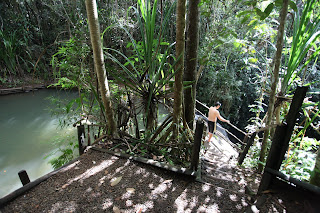Colo-i-suva is a 2.5 km rainforest park about 30 minutes north of our hotel. Along with a few other adventurous hotel guests we rent a taxi for a day and head out in the morning. We can hear the upper swimming pools about fifteen minutes past the trailhead and take the left turn towards them. Already feeling the heat I dive in right away. After cooling off a bit we follow the Waisila Creek as it winds down over waterworn rocks and through the trees to a series of waterfalls and swimming pools, all the while listening to the melodic bird life.
Upon returning to the taxi driver, he informs us that he has arranged for his wife to prepare dinner for us. Everyone seems in accord so he takes up farther up north towards his home. On the way he says there is something we need to see and take some pictures of so he turns off the road and drives to a riverbank where a bunch of Hindu people are having a meeting. The beat of drums and chimes are in the air as we get out of the cab. He tells us that this is a once a year ceremony and that we shouldn't get too close but that's not a problem for the telephoto lens. After the men are pierced through the ears, shoulders, mouth, and chin, the dancing begins and they move toward a bus that takes them to the second trial, firewalking, which we won't get to see tonight.
Reaching Ashook's home that he was born in, we are greeted by his wife, three children, niece, two brothers, father and mother, and grandchild. We hang out in the living room which looks much like a typical living room, with a T.V. and stereo, and chat about life in Fiji, while Ashook keeps our beer mugs full with Fiji Bitter. The dinner table is laid out full. There are a few curries, chicken, lamb, chickpea, roti, some spices, tamarind, ginger, anise, and rice all delicious after a day at the pools. Over dinner he tells us about some things going on Fiji with the tension between indigenous Fijians and Indian-land owners. Stemming from the indentured servants brought to Fiji from India to work the sugarcane plantations in the 1800's, many Indians were leased land after their service and recently the leases have expired. Due to the large amount of Indians taking over the land native Fijians have refused to renew land rights and the European Union has discontinued the subsidy on sugar cane, as he explains it, work is hard to find. But after dinner he leans back in his chair and says "but life is good here, money isn't everywhere, your stomach is everywhere" and rubs his large belly, we all agree. After the meal some girls get some henna tattoos from the younger daughters, and then we say our goodbyes, we have a cab waiting. With full bellies we return to the hotel to rest up for another day.





















No comments:
Post a Comment